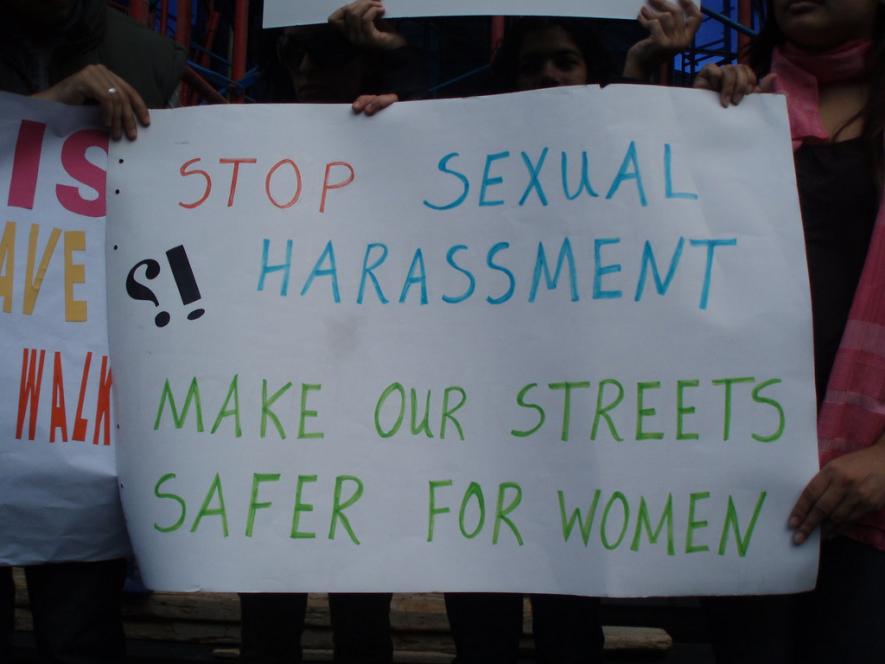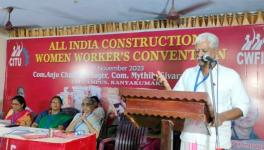A Woman Domestic Worker Narrates the Blind Side of ‘Due Process’

Representation image. | Image Courtesy: flickr
The location of #metoo movement remained largely confined within the online space and among a certain section of the relatively privileged population. Without taking away from its ability to initiate a conversation, it is perhaps fair to reflexively point out its gaps. It did not bring a large section of vulnerable women working in the informal sector within its scope.
Keeping this as the context, Centre for Equity Studies launched a study to understand the nature and extent of sexual harassment in informal sector such as the film industry. One of the occupational categories that we focused on was domestic work. The biggest challenge women face using the legal recourse is that there is a huge taboo around women speaking against sexual violence. Time and again, the blame is very conveniently shifted onto the victim. Domestic work is already stigmatised, and women who complain of sexual harassment face double the stigma and jeopardise their position in the workplace. However, those who overcome this and are brave enough to openly talk about persistence of sexual violence in domestic work are still unable to access legal recourse.
In the beginning of our fieldwork, one of our respondents, Rashida, amused at our endeavour, very wisely, but in jest, said that their “life is not like Crime Patrol”. We interpreted it as law enforcement not being as responsive to their plight as they see on television. However, as we kept collecting narratives of women’s experience of sexual violence, we realized for “due process” to have even a fighting chance, life and events need to have linearity and fit the narrative of victim and accused. Moreover “due process” assumes that the victim has a reasonable degree of freedom and means to register and fight her case. During our fieldwork we encountered several such women whose lives defy the neat categorization that legal framework demands. Rupa (name changed for anonymity) is one of them.
Rupa met us in a small room of a slum in Gurgaon with her six-month-old baby in tow. It was a wintery evening of December 2019. This was not her house as her husband was home and so meeting us there was not an option. The meeting was facilitated by Elizabeth K, co-founder of Haryana Domestic Workers Union. Rupa was mildly amused at our desire to interview her. After explaining that our research was on sexual harassment that women face in the workplace she said “ask me anything, I will tell you everything”. What followed was an extraordinary account of her life story.
HARASSMENT AS A NORM
On her identity card, Rupa is 27 years old, but she cannot be sure. Her narrative of her life is neither linear nor precise, but based on her memory and estimations. She says that she was brought to Delhi from a village in Jharkhand when she was only nine years old. A relative from the village got her to Delhi through an agency as her parents were too poor to take care of her. She vaguely remembers working full-time in a house. She has very little memory of this period as everyone in Delhi spoke an alien language to her. Her only way of communication was head nods indicating “yes” and “no”. However, she clearly remembers that neither she nor her family received any payment for her labour. She remembers that only the agency and her relative who got her to Delhi got a sum when she started working there. After a couple of years she fell sick and managed to go back home.
Few months later, her own male cousin dropped her at an agency that recruits and supplies domestic workers in Delhi. When we asked her about her experiences of sexual harassment, she did not simply have one or two incidents to tell but a recollection of serial harassments both at the agency and at the homes she worked. The supervisor at the agency insisted that all the girls should sleep in the same room as him. He usually slept on the bed and they were on the floor. One night she woke up to find him sleeping next to her and started screaming. His wife, who was pregnant at the time was sleeping in the next room. Her screams woke the agents’ wife who came and scolded her instead of chastising her husband. Rupa assumed that bhabhi (the agent’s wife) must have been scared of him too.
Rupa went on to add that she, like many of the girls in the agency, sometimes joined a household knowing and anticipating the possibilities of violence. In fact few houses were known repeater offenders. When a girl not being able to take the violence would run back to the agency, the agency owner would send a different and preferably more naive girl to the said house in full knowledge. Often these houses would also pay a hefty amount to incentivize the agency owner’s compliance. She recollected an incident where she had to go to one such house. An old man would play sleazy songs on television and ask her to give him a body massage. And while she would be massaging he would elbow her breast and smile at her. She said, initially the daughter in law would sympathize with her but later even she started to ask her to stop whining about it. She eventually quit the house and came back to the agency. And like every other time they put a new girl in her place. And business went on as usual hoping that the new girl would “adjust” and just keep working there.
NO PLACE CALLED HOME
Rupa started to face harassment at the agency and the houses that she was sent to work from her early teens. She was not alone in this. Most of the girls at the agency would face similar fate. However, her position was particularly precarious as no one from her family kept in touch with her after they dropped her at the agency. So, when the families she worked for went on vacation, unlike other girls she had no family to go back to. Her only refuge was the agency supervisor who she called her mama (uncle). This was the same man who had sexually harassed her.
More than the harassments and the hard work at a young age, what bothered Rupa was a deep sense of abandonment, the lack of a safe home to go back to and a sense of belonging to a family. Hoping to find a family, she sought friendship among the other girls at the agency. She recollected that some of them were nice to her and others took advantage of her longing for acceptance. She recalls how one of her closest friends promised to make Rupa her sister in exchange for Rs.10,000. The offer being too good to be turned down, Rupa managed to collect the sum. However, the girl betrayed her trust and ran away with the money. Later, another older woman who she was close to cheated her of Rs.15,000 in a similar way. She remorsefully adds that she knew that she would be cheated, but she was too young and desperate to not take the chance.
While it was surprising for us to find out about the transactional value of relations we take for granted, for Rupa a family and a residence to call of her own was at the heart of all her struggles. Besides the tremendous psychological and social bearing it had on her life, she soon realized that without any family she has no identity. She does not exist before the state claim to citizenship is designed around the assumption that everyone has a family. Despite being betrayed twice, her search for an adoptive family continued. She was finally able to find someone to rely on. It was a girl with whom she worked in Delhi. She took her home in North Bengal and convinced her family to adopt Rupa. They helped her get her Identity Cards. She stayed with her adoptive family for a couple of years. She supported her new family by working as an agricultural labour and in tea gardens. Rupa recalled that her adopted mother and father loved her, but her sister and brothers were getting very jealous so she moved back to Delhi. Soon after, she got married with a boy from Bengal who worked in Chennai. After their marriage she moved to Chennai and worked in a garment factory. There her monthly salary was Rs.9,000, but never got the full amount as they would always deduct money for something or the other. Eventually, her husband also quit his job and she decided to come back to Delhi (Gurgaon) with her husband as she was more confident of finding work here.
Since then, she has largely supported her husband and now her newborn. However, with no or little support from her husband it had been difficult to work during pregnancy. She had often starved during that period. She painfully remembers that at one point when her child fell sick and had to be hospitalised, she had no money and had to borrow. Her husband, despite being aware, did not come to visit them at the hospital. Instead he was spotted wearing new clothes and having a good time with his friends. She complained that instead of supporting her and their son, he just loiters around and spends her money. He also gets routinely abusive towards Rupa.
Despite the life story of Rupa being filled to extreme hardships, at no point does she come across as a passive witness to her trial filled life. She is not a hapless tortured woman stuck in a bad marriage, but a woman who is acutely aware of her lack of resources and thus consciously has made a choice to stay in the physically and financially abusive husband as she explains violence from a known man is safer bet than being a single mother having to face violence from men in the society at large. Without agreeing or disagreeing with her statement, one can admire her clarity of judgement.
FAILURE OF DUE PROCESS
Lives of many women are fractured and resist a linear narrative. But, the laws that are supposed to protect them are extremely structured and categorical. They fail to account for the complexities of their lived experiences. Rupa has faced sexual harassment at work routinely from a very young age. Unlike many women in similar circumstances, she doesn’t shy away from talking about it. She is in touch with the local Domestic workers Union and is acquainted with a Local Complaints Committee member. Despite her access to these networks of support, she has never thought about filing a complaint. Perhaps a greater irony is that people who supported her have routinely harassed her. Thus complaining would remove her support network, even though there is no guarantee that the harassment would stop. Besides, she is well aware though the law is supposed to protect her, the legal system is stacked against her. It would drain her resources, time, question her “respectability” and most likely not deliver justice. Due process is no relief, but rather a threat to her. The wise Rashida surmises that after all “the law-makers did not imagine poor women in domestic workers having to do anything with the law.”
The authors are researchers at the Centre for Equity Studies, New Delhi. This article is part of a larger study on sexual harassment in workplaces meant for the India Exclusion Report. The views are personal.
Get the latest reports & analysis with people's perspective on Protests, movements & deep analytical videos, discussions of the current affairs in your Telegram app. Subscribe to NewsClick's Telegram channel & get Real-Time updates on stories, as they get published on our website.
























